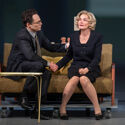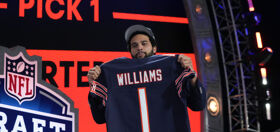
![]() This article was written by Jane Czyzselska, for guardian.co.uk on Monday 26th July 2010 08.00 UTC
This article was written by Jane Czyzselska, for guardian.co.uk on Monday 26th July 2010 08.00 UTC
It must be a record of sorts. Out of 39 hours of some of the most popular BBC1 shows, just 29 seconds featured lesbians, a study commissioned by the gay charity Stonewall has found. Here’s a blow-by-blow account of this quantum of airtime: a homophobic exchange between Eastenders’ Roxy, Pat and Bianca; and a “playful” introduction of Jeremy Clarkson by Jonathan Ross in which Ross describes the provocative petrolhead as a man not loved by lesbians. (He got that right. Clarkson repeatedly decries “big, weird dungaree-wearing lesbian parents” or “black lesbian Muslims”, while lusting after “the proper ones in stockings that you find on the internet”.)
The study explored the portrayal of homosexuality on television. It monitored the 20 programmes most popular with young viewers for 16 weeks – 126 hours of programming in all – to see how gay men and lesbians were portrayed. Across all the channels monitored – BBC1, ITV1, C4 and Channel 5 – gay people were portrayed positively and realistically for only 46 minutes. Just seven minutes of the entire output featured scenes where homophobia was challenged; most of it used being gay or the possibility of being gay to tease and insult.
There are lesbians on TV, of course, but they are no substitute for lesbian storylines on popular programmes. My Monday nights were recently transformed by BBC2’s fabulous Mary Portas, for example. But although Portas doesn’t hide her sexuality, it’s not obvious, as it is with most camp gay male TV presenters. Her nuanced expression of femininity goes under the radar. Think too of the BBC’s sports presenter Clare Balding and newsreader Jane Hill, both immensely popular – and lesbian lite.
How about we take this to the next level?
Our newsletter is like a refreshing cocktail (or mocktail) of LGBTQ+ entertainment and pop culture, served up with a side of eye-candy.
Reality TV fares a little better: we’ve had Rhona Cameron and Martina Navratilova on I’m a Celebrity, and Channel 4’s Big Brother has recently featured two lesbians: Corin and Shabby. According to Shabby, Corin talks about her girlfriend all the time in the house yet this is rarely shown in the edited highlights. Shabby reckons it’s because she looks a bit like a dolly bird, and that the programme’s producers want her to pass for heterosexual, something that would be impossible with Shabby who dresses like the artful dodger.
Many people are puzzled by us, and their anxious befuddlement translates into crude stereotyping or, unconsciously perhaps, a refusal to see us at all. This is harmful to young people who are in the process of discovering their sexuality. The young people Stonewall works with tell them time after time that visible role models help restore the self-esteem that’s often been knocked out of them by homophobic bullying or an anti-gay environment in schools. But being exposed to varied expressions of femaleness is vital for everyone, not just young lesbians.
Lesbians behave differently. We don’t place men intimately and centrally in our lives. We don’t tend to relate to and about men in the way that is expected of women, which is problematic in a society where femaleness is still defined reductively, in opposition to maleness. Some people find it personally disorientating to countenance this. But when I wrote a dating column in the now defunct London Paper, heterosexual women often wrote to me saying how much they enjoyed learning about female life from a different perspective.
Things are looking up: this autumn BBC3 will screen a six-part lesbian drama, Lip Service, which throws light on a group of Glaswegian twentysomethings. Its not exactly Shakespeare, but its depiction of young lesbians is right on the money. When DIVA magazine spoke to the show’s lesbian writer and creator Harriet Braun she explained, “It’s a story and I can only aim to tell it as authentically as I can.” Amen to that.
guardian.co.uk © Guardian News and Media Limited 2010
[Pictured: BBC3’s Lip Service]




















Charlie-o
There’s a lesbian TV critic who writes for our local gay paper. A lot of her job seems to be counting gay kisses. So she has to watch all the soap operas and count all the gay kisses – and then on to the sitcoms and drama series. And I reallly feel sorry for her, because to get me to watch those programs, they’d have to do a whole lot more than kiss!
Rebecca
I am annoyed that there are not that many lesbian storylines/programmes that really justify a lesbian relationship – Love, rather they portray a lesbian relationship to involve a man half of the time AND the lesbians are usually some kind of person that comes under the mental health act!
Second of all, Corin from big brother is NOT in my eyes a lesbian. She IS in a same sex relationship BUT she CHOOSE to be with a woman after finding no man could replace her husband. In my eyes being a lesbian is not something you can choose, its just in you. This is why its so hard in society they think we choose to be this way… Where as it really isn’t a choice…
I’d love to be able to make some kind of documentary that shows how a REAL lesbian relationship works… NORMAL! Not any mental health, not on cheating on eachother, not anything to do with MEN because to be honest, they make lesbians out to just basically be BISEXUAL! ARGH rant over.